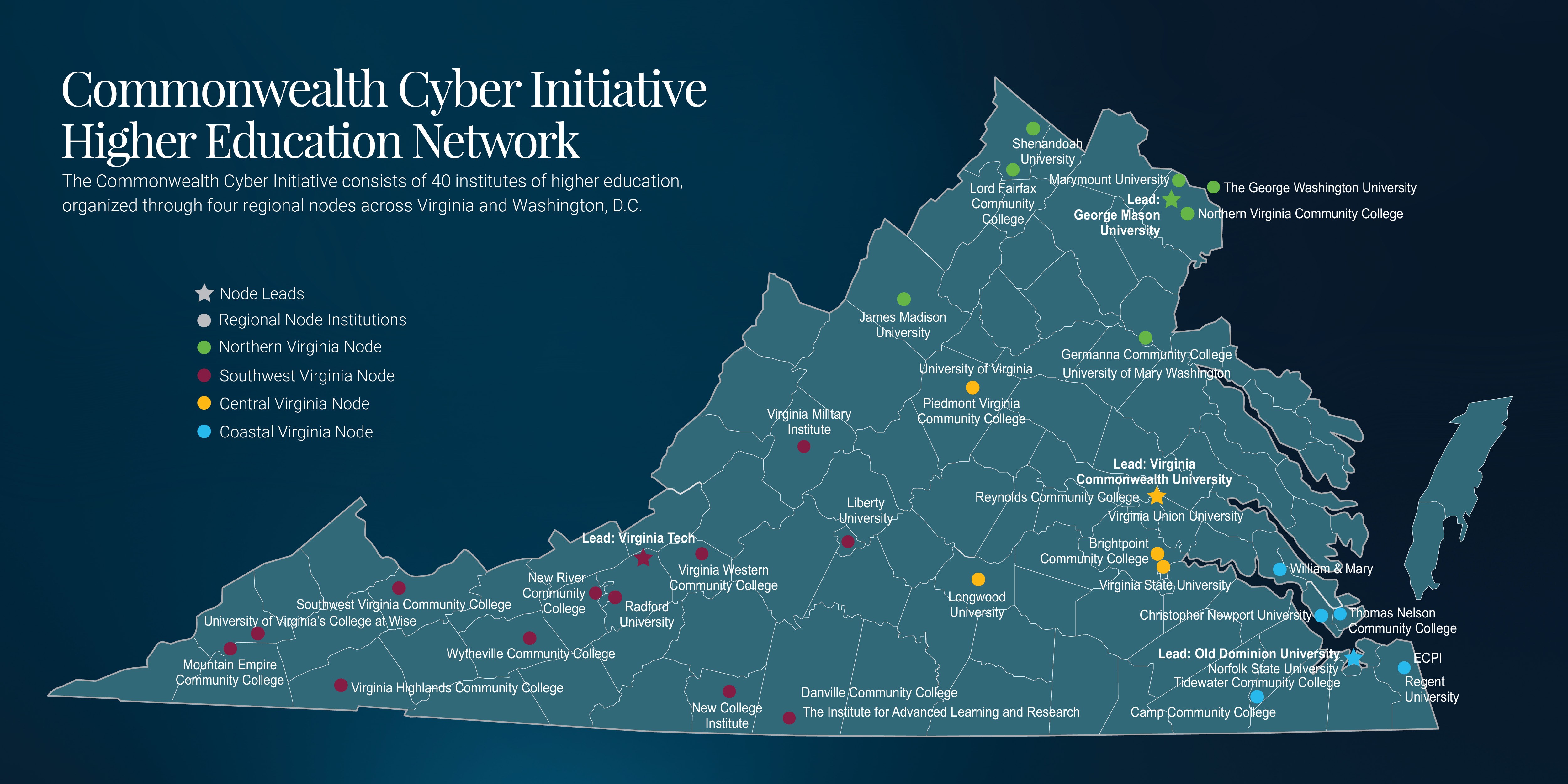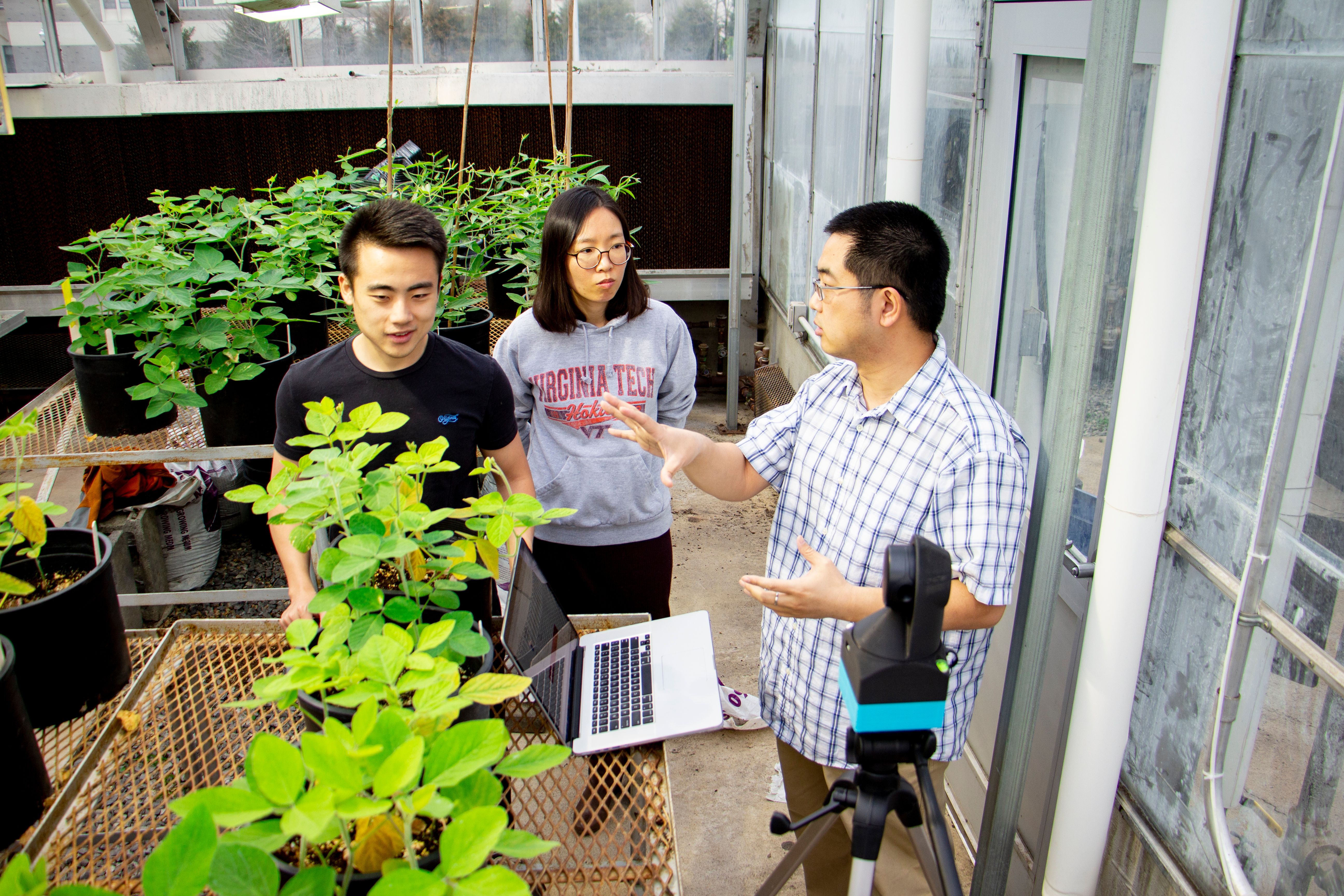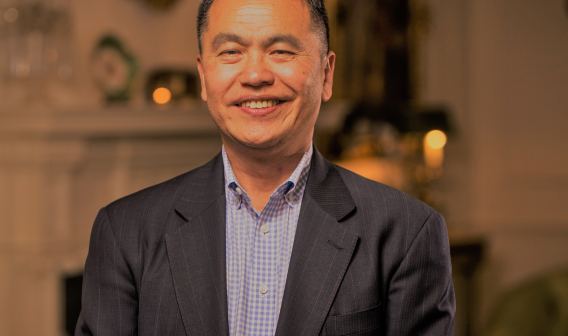A New Approach to Cyber Collaboration
Focused on Cyber Defenses and Talent Development, the Commonwealth Cyber Initiative is Cementing Virginia's Position as a Global Leader in Cybersecurity Research and Innovation
2020 saw a number of records broken when it comes to the amount of data lost in cyberattacks. Damages from these attacks are projected to carry a global cost of $6 trillion annually, up from $3 trillion in 2015, reports Cybersecurity Ventures — and it’s only going to go up from here.
“With the explosion in the use of artificial intelligence and more and more devices like drones and sensors being connected to the network, the threat surface also expands,” said Luiz DaSilva, executive director of the Commonwealth Cyber Initiative (CCI), a state-backed network that supports collaborative research across universities, government entities, and private industry. “We need to harden our systems to defend against a whole new generation of attacks.”
Strengthening Virginia’s approach to cybersecurity against these new types of attacks is one part of the mission driving CCI. The program was established in 2018 to secure Virginia’s place as a global center of excellence for research and innovation around cybersecurity technologies. Research supported by the initiative is seeking to expand innovation and entrepreneurship around autonomous systems, artificial intelligence (AI), 5G applications, and entirely new approaches to cybersecurity.
“CCI researchers have been working on preventing and defending against a number of attacks on our critical infrastructure, from the power grid to agriculture to communication networks,” DaSilva said.
As for the other component of the initiative’s mission? It’s all about ramping up talent development within the Commonwealth to support the tremendous demand for cybersecurity expertise.
Regional Focus, Collaborative Approach
CCI’s cybersecurity research spans a wide range of topics, some well beyond a traditional IT approach. To date, CCI has funded more than 30 research proposals through multi-million-dollar cybersecurity research collaboration grants. Researchers are investigating cybersecurity needs in terms of new technologies, but they’re also exploring these needs through unique regional lenses.
Because each region of Virginia faces different risks and unique workforce development needs, CCI has taken a Hub and Node approach to its organization. The hub, located in Arlington County, coordinates the entire network, while each of the four regional nodes are focused on a specific region. For example, cybersecurity in the maritime and defense industries is an area of focus at the Coastal Virginia node. Cybermanufacturing is of particular interest at the Northern Virginia node, leveraging nearby organizations including the Cybersecurity Manufacturing Innovation Institute and the National Association of Manufacturers. Cybersecurity for agricultural applications is a major priority for the Southwest Virginia node, which covers a largely rural corner of the Commonwealth.
Virginia Commonwealth University (VCU) is the lead of the Central Virginia node, which focuses in part on medical device security — protecting internet-connected devices such as patient monitors, CPAP machines, and glucose monitors. Connected medical devices can help patients receive care that is safer and timelier, but are vulnerable to security breaches.
“Many of our researchers throughout the Central Virginia region have been tackling these topics for years,” said Erdem Topsakal, director of the Central Virginia node and chair of the Department of Electrical and Computer Engineering at VCU, “but with the encouragement of CCI, we are now working together across institutions and building strong collaborative efforts across the region and the state. These topics are having impacts on people’s lives right now. With the support of CCI, we’re able to pursue research that really makes a difference.”
Gretchen Matthews, director of the Southwest Virginia node and professor of mathematics at Virginia Tech, notes that CCI Southwest-funded projects are creating experiential learning opportunities that put students at the forefront of providing cyber solutions in rural environments.
“Transferring data captured by sensors for livestock, crops, and environmental assessments and autonomous and robotic systems is challenging due to networking infrastructure and limitations,” she said. As such, the node is focused on addressing networking infrastructure through designs that are sensitive to environmental and agricultural needs.
A current Coastal Virginia CCI-led research initiative brings together partners from Old Dominion University (ODU), Virginia Tech, and the defense industry in developing a backdoor detection and mitigation system for the neural networks within AI-supported combat systems. Data has become a critical part of modern warfare, but greater adoption of AI means new vulnerabilities to cyberattack. Bringing together armed forces expertise with university researchers makes an even stronger value case, because it builds critical skills among local students soon to seek employment from local defense partners.
“Our students benefit from the knowledge they acquire from their internships, our business partners benefit from the ability to hire experienced graduates as well as the opportunity to access up-to-date information, and faculty and researchers benefit from the insight provided by our industrial partners,” said Brian Payne, vice provost for academic affairs at ODU and director of the Coastal Virginia CCI node.
CCI is also supporting innovators in getting critical technology advancements to market. It’s scaling a program to the whole state that will provide inventors within CCI universities and colleges with bridge funding toward commercializing their inventions.
Talent Development Where It's Most Needed
This regional approach has also helped employers position their organizations to appeal to the local workforce. “We’ve had success in hiring systems engineers and security engineers, but struggle to find qualified software engineers,” said Tracy Gregorio, CEO at G2 Ops Inc. in Virginia Beach and a member of the CCI technical advisory board. CCI is helping each of Virginia’s regions to better compete against other states with strong technology centers by training and hiring local experts.
Virginia has the highest concentration of cybersecurity workers of any state — nearly five times the national average — according to the National Institute of Standards and Technology National Initiative for Cybersecurity Education’s CyberSeek tool. Even so, the Commonwealth is not immune to the talent gap affecting the rest of the country.
“CCI’s objective is to ensure a sufficient supply of cyber talent, with a particular focus on diversity and multidisciplinarity, and to form professionals who have rich hands-on experience,” DaSilva said.
CCI is working to incentivize students from a broader array of disciplines to understand how their work can impact cybersecurity projects. This has meant involving faculty and students in geography, political science, and communications, among a range of other fields, including the arts.
Through the Building Bridges Arts and Design Collaboration Program, CCI is specifically engaging researchers within the arts to depict the results of cybersecurity research for both scientific and creative purposes. For example, a multimedia gallery developed by Michael McDermott, assistant professor, art and graphic design, at George Mason University, will display images, audio, and text fragments taken from smartphones to demonstrate the ease of recovering deleted data. Other projects approach technology through the lens of music, dance, and gaming. These efforts are nods to both the pervasiveness of data in all aspects of life and strategies for broadening awareness of cybersecurity beyond the traditional IT focus.
“Students learn a great deal when they work with those from different institutions, programs, and backgrounds,” Payne said. “Who knows? One of their proposals might lead to the next great cybersecurity business or product. We can be assured that these students will be prepared as thinkers, communicators, problem solvers, and collaborators.”






